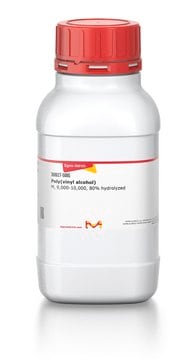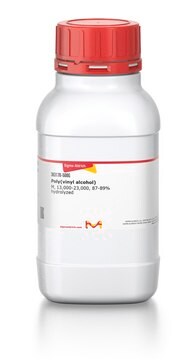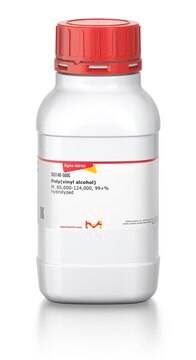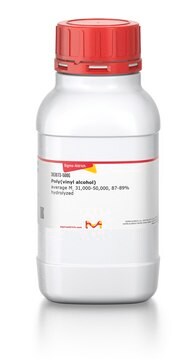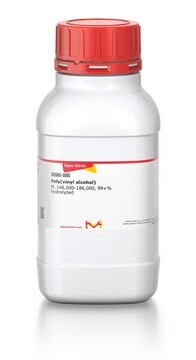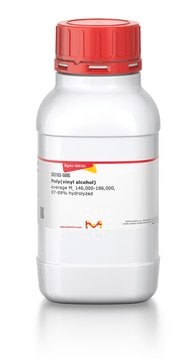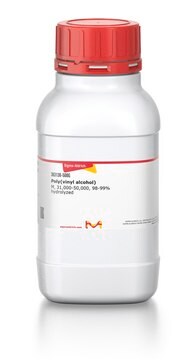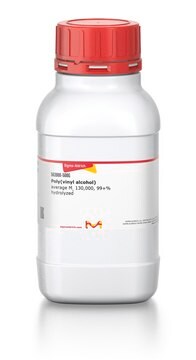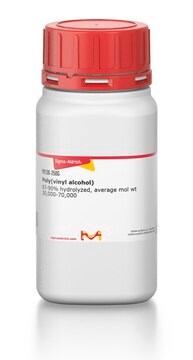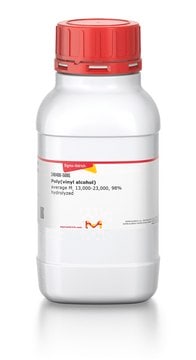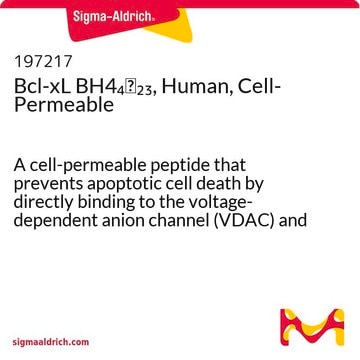Összes fotó(2)
Fontos dokumentumok
363081
Poly(vinyl alcohol)
average Mw 85,000-124,000, 87-89% hydrolyzed
Bejelentkezésa Szervezeti és Szerződéses árazás megtekintéséhez
Összes fotó(2)
About This Item
Javasolt termékek
Minőségi szint
form
powder or crystals
molekulatömeg
average Mw 85,000-124,000
leeső golyó
23-27 cP, 4 % in H2O(20 °C)(lit.)
InChI
1S/C2H4O/c1-2-3/h2-3H,1H2
Nemzetközi kémiai azonosító kulcs
IMROMDMJAWUWLK-UHFFFAOYSA-N
Looking for similar products? Látogasson el ide Útmutató a termékösszehasonlításhoz
Related Categories
Általános leírás
Polyvinyl alcohol(PVA) is a linear hydrophilic synthetic polymer with a backbone composed of only carbon atoms. Due to its inertness and stability, it is considered safe and biocompatible. It is also biodegradable under both anaerobic and aerobic conditions. Owing to its unique properties such as adhesiveness, safety, strength, film-forming, swelling, and non-carcinogenicity, it is widely used in paper, adhesives,food, biomedical and pharmaceutical industries. The partially hydrolyzed PVA(87–89%) is more soluble in water and it has more flexibility and adhesion tohydrophobic surfaces.
Alkalmazás
PVA has remarkable properties for a polymer to be used in drug delivery systems such as high surface stabilization, and low protein adsorption. The use of PVA in solid dispersion prevents crystal formation and improves the solubility of drugs. It can also be used as a granulating liquid to prevent slow crystal growth and nucleation. In conjunction with its copolymers, it can be useful for both hydrophilic and hydrophobic drugs. PVA hydrogels and microparticles can be used in drug delivery systems for cancer drugs.
PVA can be used as a surface stabilizer in preparing drug delivery carriers for the slow release of tetracycline.
Highly concentrated alginate/polyvinyl alcohol (PVA) bioinks can be used to prepare 3D bioprinting porous scaffolds. Partial diffusion of PVA sols from printed scaffolds creates a large number of micropores.
PVA can also be used as a water-soluble polymer template to synthesize nanosized polypyrrole via in situ polymerization. PVA generates stable dispersions of polypyrrole nanospheres in water and the size of nanospheres depends on the molecular weight and concentration of PVA.
PVA can be used as a surface stabilizer in preparing drug delivery carriers for the slow release of tetracycline.
Highly concentrated alginate/polyvinyl alcohol (PVA) bioinks can be used to prepare 3D bioprinting porous scaffolds. Partial diffusion of PVA sols from printed scaffolds creates a large number of micropores.
PVA can also be used as a water-soluble polymer template to synthesize nanosized polypyrrole via in situ polymerization. PVA generates stable dispersions of polypyrrole nanospheres in water and the size of nanospheres depends on the molecular weight and concentration of PVA.
Tárolási osztály kódja
11 - Combustible Solids
WGK
WGK 1
Lobbanási pont (F)
No data available
Lobbanási pont (C)
No data available
Egyéni védőeszköz
Eyeshields, Gloves, type N95 (US)
Válasszon a legfrissebb verziók közül:
Már rendelkezik ezzel a termékkel?
Az Ön által nemrégiben megvásárolt termékekre vonatkozó dokumentumokat a Dokumentumtárban találja.
Az ügyfelek ezeket is megtekintették
Chihiro Fujiyabu et al.
Scientific reports, 9(1), 10653-10653 (2019-07-25)
Recent progress in whole genome sequencing has revealed that animals have various kinds of opsin genes for photoreception. Among them, most opsin genes have introns in their coding regions. However, it has been known for a long time that teleost
Gabriela Rivera-Hernández et al.
International journal of pharmaceutics, 600, 120478-120478 (2021-03-17)
Polyvinyl alcohol (PVA) is a biodegradable semicrystalline synthetic polymer that has been used for biomedical applications for several years. In the pharmaceutical area, PVA has been widely used to prepare solid dispersions to improve the solubility of drugs. Furthermore, it
Gang Wang et al.
PloS one, 6(11), e27605-e27605 (2011-11-24)
Mucosal vaccination has been demonstrated to be an effective means of eliciting protective immunity against aerosol infections of foot and mouth disease virus (FMDV) and various approaches have been used to improve mucosal response to this pathogen. In this study
Adam C Wilkinson et al.
Nature, 571(7763), 117-121 (2019-05-31)
Multipotent self-renewing haematopoietic stem cells (HSCs) regenerate the adult blood system after transplantation1, which is a curative therapy for numerous diseases including immunodeficiencies and leukaemias2. Although substantial effort has been applied to identifying HSC maintenance factors through the characterization of
Cijun Shuai et al.
Biofabrication, 5(1), 015014-015014 (2013-02-07)
A tetragonal polyvinyl alcohol (PVA) scaffold with 3D orthogonal periodic porous architecture was fabricated via selective laser sintering (SLS) technology. The scaffold was fabricated under the laser power of 8 W, scan speed of 600 mm min(-1), laser spot diameter of 0.8 mm
Tudóscsoportunk valamennyi kutatási területen rendelkezik tapasztalattal, beleértve az élettudományt, az anyagtudományt, a kémiai szintézist, a kromatográfiát, az analitikát és még sok más területet.
Lépjen kapcsolatba a szaktanácsadással
